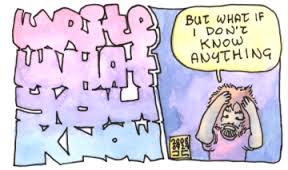 There is a piece of advice, given to young authors so often that it sometimes seems to be a vulgar сliché – “Write what you know”. There are some writers, who support this claim, and some, who do not. Each of them can provide you with a set of persuasive reasons and we shall review these arguments on both sides.
There is a piece of advice, given to young authors so often that it sometimes seems to be a vulgar сliché – “Write what you know”. There are some writers, who support this claim, and some, who do not. Each of them can provide you with a set of persuasive reasons and we shall review these arguments on both sides.
Write What You Know
People often think that the concept of “write what you know” itself defies such genres as science fiction and fantasy. Even writing about the experiences of a human of an opposite sex does not pass the limitation of this saying! At least, this is what people think. But it’s often forgotten, that you do not only know the things that happen to you. A writer knows many stories, they surround him and all he has to do to be a good writer is to draw the plots of his books out of the lives of the people he watches. Besides, the main meaning of “write what you know” concept is to live through every twist in the plot you write – mentally at least. Besides knowing you need to feel what you are writing about. All emotional details may be crucial to make the book mesmerize the readers. Zoë Heller, the author, critic and journalist, says: “Most writers have, for reasons of diffidence, or snobbery, or fear of exposure, done the same thing at some point in their writing lives — unconsciously censored themselves and thrown out the wheat, mistaking it for nonliterary chaff. In this sense, the reminder to write what you know — what you really know, as opposed to a slick, bowdlerized version of what you know — continues to be pertinent advice”.
Writing As Astral Projection Device
As far as we know it, best stories never happened. Let’s think of all the planets that would never be visited, of all adventures that would never be real, of all magical worlds we would never know if not for the literature. How many books about women are written by men and vice versa, and how refreshing these approaches might be. If the literature was nothing but a plain mirror, which reflects our world, readers would have no worlds to escape into at the time of despair and writers would have no possibility to go beyond the abilities of their bodies and life conditions. For the authors, writing is just another way to look outside the box. Mohsin Hamid, an American writer, muses: “A human self is made up of stories. These stories are rooted partly in experience, and partly in fantasy. The power of fiction lies in its capacity to gaze upon this odd circumstance of our existence, to allow us to play with the conundrum that we are making ourselves up as we go along.”